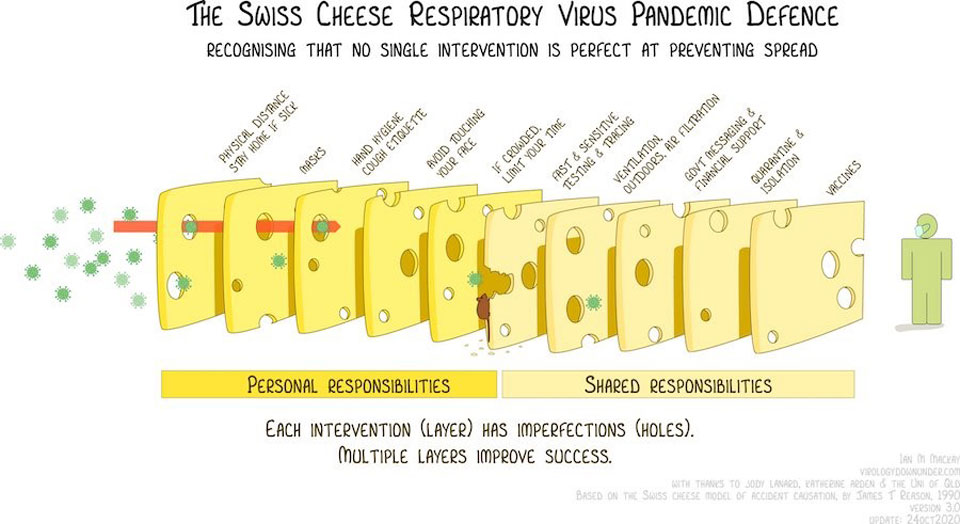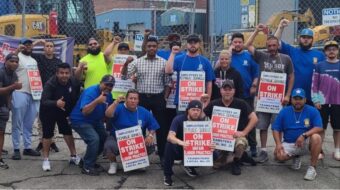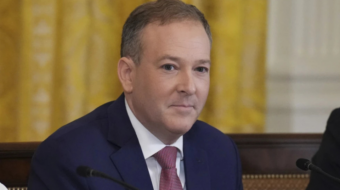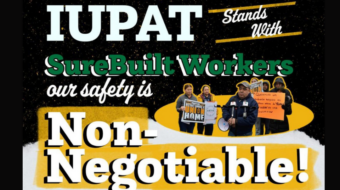
OAKLAND, Calif.—Wear a mask? Don’t wear a mask? Stand six feet away? Stand less than that? Go to bars and events with big crowds? Don’t go? The Center for Disease Control’s latest guidance on battling the coronavirus pandemic is drawing confusion and criticism, especially from the two major unions of front-line workers, National Nurses United and the United Food and Commercial Workers.
The CDC announced on May 13 that “if you are fully vaccinated” against the virus, officially called Covid-19, you can resume many normal “safer” activities. That’s despite the continually rising toll of positive tests—33.041 million, equal to one of every 10 people in the U.S.—and deaths (588,185) since the pandemic officially began on March 13, 2020.
In response, even “blue” states and cities that had shut down longer and harder rushed to reopen bars, restaurants, and arenas, let crowds of larger than ten people gather and signal that school systems should fully reopen, with precautions.
“On July 1, we will take the final step,” said Gov. Gretchen Whitmer, D-Mich., who was under literal siege last year by armed anti-mask right-wingers and other virus skeptics. That final step includes 50% capacity in restaurants and no more outdoor masks.
So Broadway will reopen. Baseball parks—other than Texan parks, forced to fully reopen earlier this year by virus denier GOP Gov. Greg Abbott—will let capacity crowds in. Bars and restaurants can resume indoor seating, although in lower numbers. And so on.
And in the immediate wake of the CDC’s announcement, Teachers (AFT) President Randi Weingarten threw her union’s official support behind the full reopening of public schools (see earlier story).
But NNU, the largest union of registered nurses, and UFCW, which represents grocery and packing plant workers and other food chain workers—all of them in vulnerable frontline jobs—say CDC’s going too far, too fast. NNU says CDC’s science is dubious, too.
Removing protections is doubly dangerous, NNU reports, because its data and related studies show fully half of the people the virus has hit caught it from infected people who show no symptoms. Those people, under CDC’s new rules, could go maskless. Yet masks are “simple, cheap and highly effective” safeguards, NNU adds.
NNU even published a 17-page medical analysis of the state of the virus, and the state of the data CDC used, or lack of it. It’s posted at www.nationalnursesunited.org.
The CDC’s new guidance “is not in the best interest” of worker protection or public health, union co-President Zenei Cortez, RN, a longtime California nurse, told a May 20 zoom press conference. “Science shows this is exactly the wrong time to relax controls.”
That’s because only 37% of U.S. adults are fully vaccinated and because virus variants are potentially more vaccine-resistant. It’s also because vaccinations of teenagers have just begun and kids under 12 aren’t vaccinated at all, she said.
And the best protection—which CDC’s new guidelines weaken and remove—is “layering” anti-vaccine measures which individually may have holes but together stop the virus’s spread, the union adds.
Cortez and the union’s health and safety director, Jane Thomason, likened the layers of protection to slices of Swiss cheese. Each slice, Thomason says, has holes and can’t completely stop the virus.
But each slice’s holes are in unique places, so no holes overlap each other when you put the “slices” against each other. Together, the protection is complete.
“Our best solution would be for everyone to keep their masks on, follow the other measures and follow the science,” added Cortez. “Our duty is to speak up and advocate for what we know is in the best interest of people’s health,” said NNU co-President Jean Ross, a veteran nurse from Edina, Minn.
It would have said the same thing to CDC if the agency had asked, Ross noted. CDC didn’t.
UFCW President Marc Perrone, whose union has seen 157,290 of its worker members, including meatpackers jammed close together in processing plants, become infected, calls CDC’s latest guidance “confusing.” Some 758 of his members have died from coronavirus infections, the union’s data shows. There’s been a 35% increase in grocery worker deaths and a 30% rise in virus infections just since March 1.
“Millions of Americans are doing the right thing and getting vaccinated, but essential workers are still forced to play mask police for shoppers who are unvaccinated and refuse to follow local COVID safety measures. Are they now supposed to become the vaccination police?” Perrone asked in a statement.
“With so many states ending mask mandates, this new guidance must do more to acknowledge the real, daily challenge workers and the American people still face. Vaccinations are helping us take control of this pandemic, but we must not let down our guard.”
The Auto Workers aren’t doing so, either. Though the union did not openly oppose CDC’s new guidance, its actions spoke louder than words.
UAW’s Covid-19 task force, representing workers at GM, Ford, and Stellantis—the old FiatChrysler—decided to keep mask-wearing, physical distancing, and other anti-viral rules in place in car plants until the Occupational Safety and Health Administration issues a standard, which it can enforce, ordering firms to protect workers against the virus.
“We know masks can be uncomfortable, but we ask that everyone comply,” UAW said. “While we continue following the protocols that kept our workplaces safe, we know one of the best ways to fight this virus is by getting vaccinated. We encourage everyone to roll up their sleeves so we can move more quickly toward continuing to relax protocols” against Covid-19.










